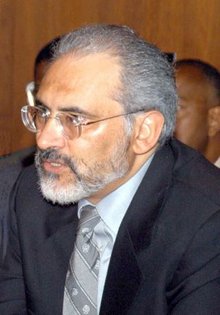archivos de los protestos globales
archives of global protests
Carlos Mesa
 Carlos Diego Mesa Gisbert (born August 12, 1953) is the current President of Bolivia, holding the office since October 17, 2003. As vice president under the previous president, Gonzalo Sánchez de Lozada, Mesa assumed the post when extensive protests and strikes shut down Bolivia in a bitter dispute known as the Bolivian Gas War, forcing Sánchez de Lozada to resign and flee the country.
Carlos Diego Mesa Gisbert (born August 12, 1953) is the current President of Bolivia, holding the office since October 17, 2003. As vice president under the previous president, Gonzalo Sánchez de Lozada, Mesa assumed the post when extensive protests and strikes shut down Bolivia in a bitter dispute known as the Bolivian Gas War, forcing Sánchez de Lozada to resign and flee the country.
Mesa had been vice president since August 6, 2002. As vice president, he was also the head of the Bolivian Congress.
Before entering politics, Mesa was a historian and a journalist in radio, television and newspapers. He is a member of the Bolivian History Academy.
Despite his lack of experience in the political arena, Mesa's star rose quickly in the Sánchez de Lozada administration. In September 2003, he was invited to address the UN General Assembly, where he warned:
Democracy is in danger in Bolivia as the result of legitimate pressures from the poor. We cannot generate economic growth and well-being for a few and then expect that the large majorities that are excluded will watch silently and patiently. We poor countries demand that our products be admitted into the markets of rich countries in adequate conditions. [1] (www.tuscaloosanews.com)
As the gas conflict escalated, Mesa became increasingly unhappy with the government's heavy-handed repression of the protests, which left an estimated 50 people dead. He withdrew his support for Sánchez de Lozada several days before the latter's resignation, saying: "I cannot continue to support the situation we are living through." This may also have had personal reasons as it opened the way to Mesa succeeding Sánchez de Lozada as president. Mesa thus adopted a "let things pass" attitude that sent him into the most powerful position in the country.
In March 2004, Mesa announced that the government of Bolivia would hold a series of rallies around the country, and in Bolivian embassies overseas, demanding that Chile return to Bolivia a stretch of seacoast which Bolivia lost in 1884 after the end of the War of the Pacific. Chile has refused to negotiate on the issue, but Mesa has made this policy a central point of his administration.
Following protests, he tended his resignation to Congress on March 7, 2005; however, the legislators voted almost unanimously the next day to reject his offer. Still, domestic tensions between the poor and rural eastern highlands and the wealthier cities and oil-rich south continued to rise. Weeks of escalating street demonstrations and widening disorder reached a peak in June of 2005, as tens of thousands of protesters marched into La Paz. Aware of his growing incapacity to control or influence events without resorting to violence, Mesa once more tended his resignation to Congress. This time, however congress accepted his offer, the presidents of the two chambers of Congress at that point abdicated their constitutional powers in favor of the chief justice of the Supreme Court and new president of Bolivia, Eduardo Rodríguez. He was charged with the duty of swiftly organizing national elections.
who is who? | presidentes | bolivia | www.agp.org (archives) | www.all4all.org
 Carlos Diego Mesa Gisbert (born August 12, 1953) is the current President of Bolivia, holding the office since October 17, 2003. As vice president under the previous president, Gonzalo Sánchez de Lozada, Mesa assumed the post when extensive protests and strikes shut down Bolivia in a bitter dispute known as the Bolivian Gas War, forcing Sánchez de Lozada to resign and flee the country.
Carlos Diego Mesa Gisbert (born August 12, 1953) is the current President of Bolivia, holding the office since October 17, 2003. As vice president under the previous president, Gonzalo Sánchez de Lozada, Mesa assumed the post when extensive protests and strikes shut down Bolivia in a bitter dispute known as the Bolivian Gas War, forcing Sánchez de Lozada to resign and flee the country.